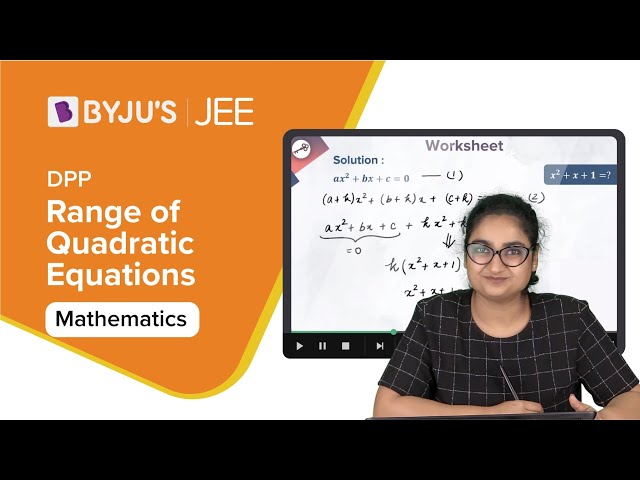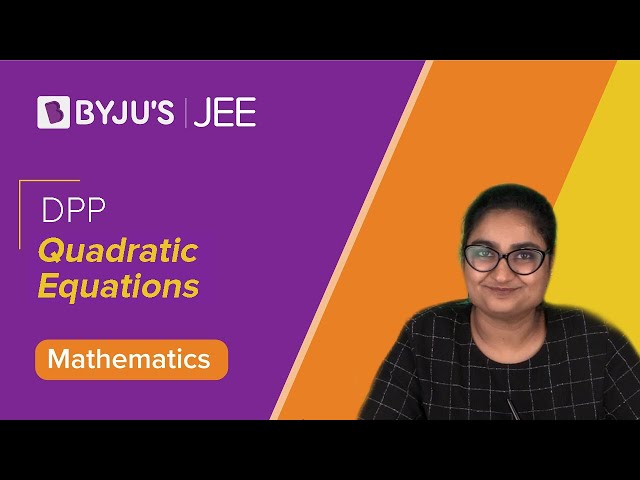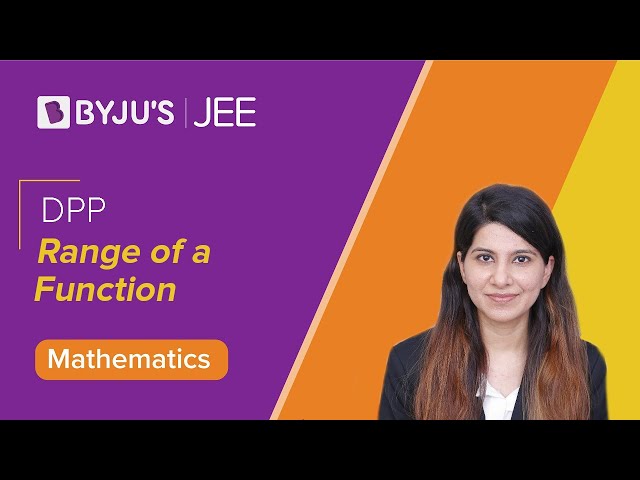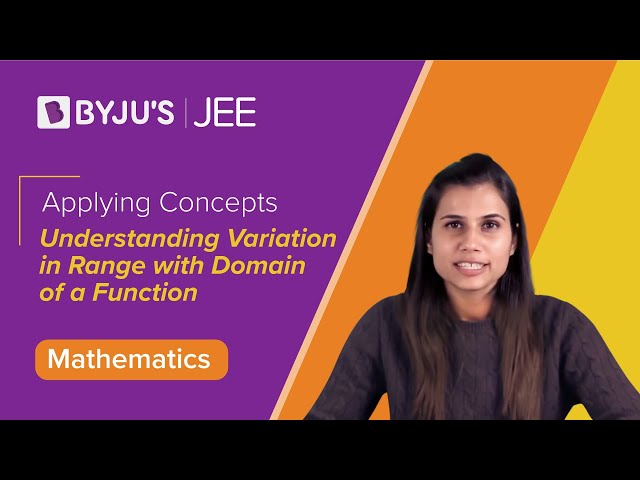Question 1: The function f : R → [(-1/2), (1/2)] is defined as f(x) = [x]/[1 + x2], is:
1) injective but not surjective.
2) surjective but not injective.
3) neither injective nor surjective.
4) invertible.
Answer: (2)
f(x) = [x]/[1 + x2]
f’(x) changes sign in different intervals.
∴ Not injective.
y = (x / (1 + x2))
yx2 – x + y = 0
For y ≠ 0
D = 1 – 4y2 ≥ 0
y ∈ [(-1 / 2), (1 / 2)] – {0}
For, y = 0 ⇒ x = 0
∴Part of range
∴Range = [(-1 / 2), (1 / 2)]
∴Surjective but not injective.
Question 2: If, for a positive integer n, the quadratic equation, has two consecutive integral solutions, then n is equal to:
has two consecutive integral solutions, then n is equal to:
1) 9
2) 10
3) 11
4) 12
Answer: (3)
Rearranging equation, we get
nx2 + {1 + 3 + 5 + ….. + (2n – 1)x + {1.2 + 2.3 + ….. + (n – 1)n} = 10n
nx2 + n2x + [(n – 1) n (n + 1)] / 3 = 10n
x2 + nx + [n2 – 31] / 3 = 0
Given difference of roots = 1
|ɑ – β| = 1
D = 1
n2 – (4 / 3) (n2 – 31) = 1
n = 11
Question 3: Let ω be a complex number such that 2ω + 1 = z where z = √-3. If  then k is equal to,
then k is equal to,
1) z
2) −1
3) 1
4) − z
Answer: (4)
2ω + 1 = z, z = √3i
ω = (-1 + √3i) / 2 [Cube root of unity]

= 3 (ω2 – ω4)
= 3 [{(-1 – √3i) / 2} – {(-1 + √3i) / 2}]
= – 3√3i
= -3z
k = -z
Question 4: If then adj (3A2 + 12A) is equal to :
then adj (3A2 + 12A) is equal to :
Answer: (1)

= (2 – 2λ – λ + λ2) – 12
f (λ) = λ2 – 3λ – 10
∵ A satisfies f (λ).
A2 – 3A – 10I = 0
A2 – 3A = 10I
3A2 – 9A = 30I
3A2 + 12A = 30I + 21A

Question 5: If S is the set of distinct values of ‘b’ for which the following system of linear equations
x + y + z = 1
x + ay + z = 1
ax + by + z = 0
has no solution, then S is :
1) an infinite set
2) a finite set containing two or more elements
3) a singleton
4) an empty set
Answer: (3)

⇒ – (1 – a2) = 0
⇒ a = 1
For a = 1
Eq. (1) & (2) are identical i.e.,x + y + z = 1.
To have no solution with x + by + z = 0.
b = 1
Question 6: A man X has 7 friends, 4 of them are ladies and 3 are men. His wife Y also has 7 friends, 3 of them are ladies and 4 are men. Assume X and Y have no common friends. Then the total number of ways in which X and Y together can throw a party inviting 3 ladies and 3 men, so that 3 friends of each of X and Y are in this party, is :
1) 468
2) 469
3) 484
4) 485
Answer: (4)

Required number of ways
= 4C3 . 4C3 + (4C2 . 3C1)2 + (4C1 . 3C2)2 + (3C3)2
= 16 + 324 + 144 + 1
= 485
Question 7: The value of (21C1 – 10C1) + (21C2 – 10C2) + (21C3 – 10C3) + (21C4 – 10C4) + … (21C10 – 10C10) is
1) 221 − 210
2) 220 − 29
3) 220 − 210
4) 221 − 211
Answer: (3)
21C1 + 21C2 + …… 21C10 = (1 / 2) (21C0 + 21C1 + ….. 21C21) – 1
= 220 – 1
10C1 + 10C2 + …. 10C10 = 210 – 1
Required sum = (220 – 1) – (210 – 1)
= 220 – 210
Question 8: For any three positive real numbers a, b and c, 9 (25a2 + b2) + 25 (c2 − 3ac) = 15b (3a + c). Then :
1) b, c and a are in A.P.
2) a, b and c are in A.P.
3) a, b and c are in G.P.
4) b, c and a are in G.P.
Answer: (1)
9 (25a2 + b2) + 25 (c2 − 3ac) = 15b (3a + c)
⇒ (15a)2 + (3b)2 + (5c)2 – 45b – 15b – 75ac = 0
(15a – 3b)2 + (3b – 5c)2 + (15a – 5c)2 = 0
It is possible when
15a – 3b = 0 and 3b – 5c = 0 and 15a – 5c = 0
15a = 3b = 5c
(a / 1) = (b / 5) = (c / 3)
∴ b, c, a are in A.P.
Question 9: Let a, b, c ∈ R. If f (x) = ax2 + bx + c is such that a + b + c = 3 and f (x + y) = f (x) + f (y) + xy, ∀ x, y ∈ R, then
1) 165
2) 190
3) 255
4) 330
Answer: (4)
As f (x + y) = f (x) + f (y) + xy
Given, f (1) = 3
Putting, x = y = 1
⇒ f (2) = 2 f (1) + 1 = 7
Similarly, x = 1, y = 2,
⇒ f (3) = f (1) + f (2) + 2 = 12
Now,
= 3 + 7 + 12 + 18 + …
= S (let)
Now, Sn = 3 + 7 + 12 + 18 … + tn
Again, Sn = 3 + 7 + 12 + 18 … + tn-1 + tn
We get, tn = 3 + 4 + 5 + …. n terms
= [n (n + 5)] / 2

Question 10:
1) 1 / 16
2) 1 / 8
3) 1 / 4
4) 1 / 24
Answer: (1)
Question 11: If for x ∈ (0, (1 / 4)), the derivative of tan-1 (6x√x / (1 – 9x3)) is √x . g(x), then g(x) equals:
1) (3x√x / (1 – 9x3))
2) (3x/(1 – 9x3))
3) (3/(1 + 9x3))
4) (9/(1 + 9x3))
Answer: (4)
f (x) = 2 tan-1 (3x√x) for x ∈ (0, (1/4))
f ‘ (x) = (9√x/(1 + 9x3))
g (x) = (9/(1 + 9x3))
Question 12: The normal to the curve y (x − 2) (x − 3) = x + 6 at the point where the curve intersects the y-axis passes through the point :
1) (1/2, 1/2)
2) (1/2, -1/3)
3) (1/2, 1/3)
4) (-1/2, -1/2)
Answer: (1)
y (x – 2) (x – 3) = x + 6
At y-axis, x = 0, y = 1
Now, on differentiation,
(dy / dx) (x – 2) (x – 3) + y (2x – 5) = 1
(dy / dx) (6) + 1 * (-5) = 1
(dy / dx) = 6 / 6 = 1
Now slope of normal = –1
Equation of normal y – 1 = –1 (x – 0)
y + x – 1 = 0 … (i)
Line (i) passes through (1 / 2, 1 / 2).
Question 13: Twenty meters of wire is available for fencing off a flower-bed in the form of a circular sector. Then the maximum area (in sq. m) of the flower-bed, is :
1) 10
2) 25
3) 30
4) 12.5
Answer: (2)

2r + θr = 20 —- (i)
A = Area = (θ / 2π) * (πr2) = (θr2 / 2) —- (ii)
A = (r2 / 2) ([20 – 2r] / r)
A = [(20r – 2r2) / 2] = 10r – r2
A to be maximum
dA / dr = 10 – 2r = 0 ⇒ r = 5
d2A / dr2 = -2 < 0
Hence for r = 5, A is maximum
Now, 10 + (θ * 5) = 20 ⇒ θ = 2 (radian)
Area = (2 / 2π) * (π) (5)2 = 25 sq m
Question 14: Let In = ∫tann x dx, (n > 1). If I4 + I6 = a tan5 x + bx5 + C, where C is a constant of integration, then the ordered pair (a, b) is equal to :
1) (1/5, 0)
2) (1/5, -1)
3) (-1/5, 0)
4) (-1/5, 1)
Answer: (1)
In = ∫tann x dx, (n > 1)
I4 + I6 = ∫(tan4 x + tan6 x) dx
= ∫tan4 x sec2 x dx
Let tan x = t
sec2 x dx = dt
= ∫t4 dt
= (t5/5) + C
= (1/5) tan5 x + C
a = (1/5), b = 0
Question 15: The integral
1) 2
2) 4
3) −1
4) −2
Answer: (1)

Question 16: The area (in sq. units) of the region {(x, y) : x ≥ 0, x + y ≤ 3, x2 ≤ 4y and y ≤ 1 + x} is :
1) 3 / 2
2) 7 / 3
3) 5 / 2
4) 59 / 12
Answer: (3)

Area of the shaded region
=
Question 17: If (2 + sinx) (dy/dx) + (y + 1) cosx = 0 and y(0) = 1, then y(π/2) is equal to:
1) -2/3
2) -1/3
3) 4/3
4) 1/3
Answer: (4)
(2 + sinx) (dy/dx) + (y + 1) cos x = 0
y(0) = 1, y(π / 2) = ?
(1/(y + 1)) dy + (cos x/[2 + sinx]) dx = 0
ln |y + 1| + ln (2 + sinx) = ln C
(y + 1) (2 + sinx) = C
Put x = 0, y = 1
(1 + 1) . 2 = C ⇒ C = 4
Now, (y + 1) (2 + sinx) = 4
(y + 1) = 4 / 3
y = (4 / 3) – 1 = 1 / 3
Question 18: Let k be an integer such that the triangle with vertices (k, −3k), (5, k) and (−k, 2) has area 28 sq. units. Then the orthocentre of this triangle is at the point :
1) (1, 3/4)
2) (1, -3/4)
3) (2, 1/2)
4) (2, -1/2)
Answer: (3)

(k2 – 7k + 10) + 4k2 + 20k = ± 56
5k2 + 13k – 46 = 0
5k2 + 13k + 66 = 0
5k2 + 13k – 46 = 0
k = [-13 ± √169 + 920]/10
= 2, – 4.6 [reject]
For k = 2

Equation of AD,
x = 2 …(i)
Also, equation of BE,
(y – 2) = (1/2) (x – 5)
2y – 4 = x – 5
x – 2y – 1 = 0 …(ii)
Solving (i) & (ii), 2y = 1
y = 1 / 2
Orthocentre is (2, 1/2)
Question 19: The radius of a circle, having minimum area, which touches the curve y = 4 − x2 and the lines, y = |x| is :
1) 2 (√2 – 1)
2) 4 (√2 – 1)
3) 4 (√2 + 1)
4) 2 (√2 + 1)
Answer: (2)

x2 = – (y – 4)
Let a point on the parabola P [(t/2) , (4 – (t2/4))]
Equation of normal at P is
y + (t2 / 4) – 4 = (1 / t) (x – [t / 2])
x – ty – (t3 / 4) + (7 / 2)t = 0
It passes through centre of circle, say (0, k)
-tk – (t3 / 4) + (7 / 2)t = 0 —- (i)
t = 0, t2 = 14 – 4k
Radius = r = |(0 – k) / √2| (Length of perpendicular from (0, k) to y = x)
r = k / √2
Equation of circle is x2 + (y – k)2 = k2 / 2
It passes through point P
(t2 / 4) + [4 – (t2 / 4) – k]2 = k2 / 2
t4 + t2 [8k – 28] + 8k2 – 128k + 256 = 0 —- (ii)
For t = 0 ⇒ k2 – 16k + 32 = 0
k = 8 ± 4√2
r = k / √2 = 4 (√2 – 1) (discarding 4 (√2 + 1)) —– (iii)
For t = ± √(14 – 4k)
(14 – 4k)2 + (14 – 4k) (8k – 28) + 8k2 – 128k + 256 = 0
2k2 + 4k – 15 = 0
k = [-2 ± √34] /[2]
r = k / √2 = [√17 – √2] / 2 (Ignoring negative value of r) ..(iv)
From (iii) & (iv),
rmin = [√17 – √2] / 2
But from options, 4 (√2 – 1)

Question 20: The eccentricity of an ellipse whose centre is at the origin is 1 / 2. If one of its directrices is x = −4, then the equation of the normal to it at (1, (3 / 2)) is:
1) 4x − 2y = 1
2) 4x + 2y = 7
3) x + 2y = 4
4) 2y − x = 2
Answer: (1)

x = –4
e = 1 / 2
(-a / e) = -4
-a = -4 * e
a = 2
Now, b2 = a2 (1 – e2) = 3
Equation to ellipse
(x2/4) + (y2/3) = 1
Equation of normal is

Question 21: A hyperbola passes through the point P (√2, √3) and has foci at (±2, 0). Then the tangent to this hyperbola at P also passes through the point :
1) (2√2 , 3√3)
2) (√3, √2)
3) (− √2 , –√3)
4) (3√2 , 2√3)
Answer: (1)
[x2 / a2] – [y2 / b2] = 1a2 + b2 = 4 and [2 / a2] – [3 / b2] = 1
(2 / [4 – b2]) – (3 / [b2]) = 1
b2 = 3
a2 = 1
x2 – (y2 / 3) = 1
∴ Tangent at P (√2 , √3) is √(2)x – (y / √3)) = 1
Clearly it passes through (2√2 , 3√3).
Question 22: The distance of the point (1, 3, −7) from the plane passing through the point (1, −1, −1), having normal perpendicular to both the lines
1) 10 / √83
2) 5 / √83
3) 10 / √74
4) 20 / √74
Answer: (1)
Let the plane be a (x – 1) + b (y + 1) + c (z + 1) = 0.
It is perpendicular to the given lines
a – 2b + 3c = 0
2a – b – c = 0
Solving, a : b : c = 5 : 7 : 3
The plane is 5x + 7y + 3z + 5 = 0
Distance of (1, 3, –7) from this plane = 10 / √83
Question 23: If the image of the point P (1, −2, 3) in the plane, 2x + 3y − 4z + 22 = 0 measured parallel to the line, (x / 1) = (y / 4) = (z / 5) is Q, then PQ is equal to :
1) 2√42
2) √42
3) 6√5
4) 3√5
Answer: (1)
Equation of PQ,
Let M be (λ + 1, 4λ – 2, 5λ + 3)

As it lies on 2x + 3y – 4z + 22 = 0
λ = 1
For Q, λ = 2
Distance PQ = 2 √12 + 42 + 52 = 2√42
Question 24: Let a = 2i + j – 2k and b = i + j. Let c be a vector such that |c – a| = 3, |(a x b) x c| = 3 and the angle between c and a × b be 30o. Then a ⋅ c is equal to :
1) 2
2) 5
3) 1 / 8
4) 25 / 8
Answer: (1)

Question 25: A box contains 15 green and 10 yellow balls. If 10 balls are randomly drawn, one-by-one, with replacement, then the variance of the number of green balls drawn is :
1) 6
2) 4
3) 6 / 25
4) 12 / 5
Answer: (4)
n = 10
p (Probability of drawing a green ball) = 15 / 25
p = 3 / 5, q = 2 / 5
var (X) = n.p.q
= 10 * (3 / 5) * (2 / 5)
= 10 * (6 / 25)
= 12 / 5
Question 26: For three events A, B and C, P (Exactly one of A or B occurs) = P (Exactly one of B or C occurs) = P (Exactly one of C or A occurs) = 1 / 4 and P (All the three events occur simultaneously) = 1 / 16. Then the probability that at least one of the events occurs is :
1) 7 / 16
2) 7 / 64
3) 3 / 16
4) 7 / 32
Answer: (1)
P (A) + P (B) – P (A ⋂ B) = 1 / 4
P (B) + P (C) – P (B ⋂ C) = 1 / 4
P (C) + P (A) – P (A ⋂ C) = 1 / 4
P (A) + P (B) + P (C) – P (A ⋂ B) – P (B ⋂ C) – P (A ⋂ C = 3 / 8
∵ P (A ⋂ B ⋂ C) = 1 / 16
∴ P (A ⋃ B ⋃ C) = (3 / 8) + (1 / 16) = 7 / 16
Question 27: If two different numbers are taken from the set {0, 1, 2, 3, ……, 10}; then the probability that their sum, as well as absolute difference, are both multiples of 4, is :
1) 12 / 55
2) 14 / 45
3) 7 / 55
4) 6 / 55
Answer: (4)
Total number of ways = 11C2 = 55
Favourable ways are (0, 4), (0, 8), (4, 8), (2, 6), (2, 10), (6, 10)
Probability = 6 / 55
Question 28: If 5(tan2 x − cos2 x) = 2cos2x + 9, then the value of cos 4x is :
1) 1 / 3
2) 2 / 9
3) −7 / 9
4) −3 / 5
Answer: (3)
5(tan2 x − cos2 x) = 2cos2x + 9
5 sec2 x – 5 = 9 cos2 x + 7
Let cos2 x = t
(5 / t) = 9t + 12
9t2 + 12t – 5 = 0
t = 1 / 3 as t ≠ – 5 / 3
cos2 x = 1 / 3, cos 2x = 2cos2 x – 1 = -1 / 3
cos 4x = 2cos2 2x – 1
= (2 / 9) – 1
= – 7/ 9
Question 29: Let a vertical tower AB have its end A on the level ground. Let C be the mid-point of AB and P be a point on the ground such that AP = 2AB. If ∠BPC = β, then tan β is equal to :
1) 1/4
2) 2/9
3) 4/9
4) 6/7
Answer: (2)

tan θ = 1/4
tan (θ + β) = 1/2
Question 30: The following statement (p → q) → [(~p → q) → q] is :
1) equivalent to ~p → q
2) equivalent to p → ~q
3) a fallacy
4) a tautology
Answer: (4)

Video Lessons – April 2nd – Maths




JEE Main 2017 Maths Paper With Solutions 2nd April























Comments